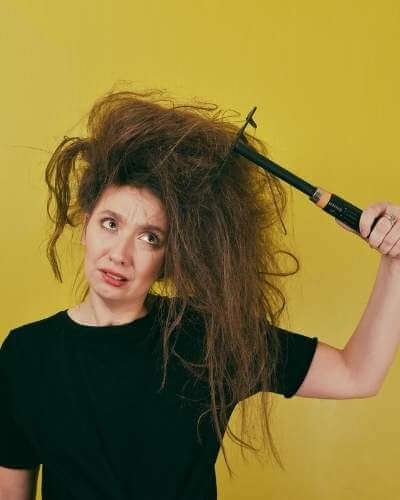Most of the time, hair that curls at the end are due to the hair tip being thinner than the root and mid hair. This makes the hair at the end lighter than the rest and tends to curl up.
Table of Contents
Why your Hair Curls up at the End and how to Stop?
The majority of the time, this is because the hair is thinner at the ends due to wear and tear. The hair at the stem and in the middle is usually significantly thicker. The lighter and more delicate the hair is near the tip, the thinner it is. Because of the difference in thickness and strength at the ends, it tends to twist or rise up. Because the ends of the hair do not have as much weight as the rest of the hair, they are prone to rising up or curling. Another factor that causes your hair to curl at the ends is the weight distribution of your haircut. When your exterior layers are trimmed, all of your hair’s weight is taken from the outside of your hair. This way, you may claim that you’ve lost your weight, which can be tough to control. Controlling the form of your hair gets more challenging at this point. When you don’t have enough weight in the appropriate places in your hair, for example, your hair will do strange things like coil up at the ends.
Hormonal changes might also be a factor. It’s not unusual for women’s and teenager’s hair to alter throughout time. Hair can grow curlier or less curly. It’s possible that you’re in the midst of a hormonal change.
Hair Weight

If you have longer hair, it may sometimes be quite beneficial to get rid of the excess weight in your hair. This will make it much easier for you to get a more textured look. You can straighten your hair if you wish, but the lighter layered portions will be difficult to manage. They are more likely to revert to their original state.
If you have mid-to-short hair, you must also be concerned about weight, but in a different way. Maintaining the weight of the hair at the bottom of your hair is crucial if you have mid to short-length hair.
Frizzy Hair
If you have frizzy hair, consider using an oil-based hair serum to weigh it down so it doesn’t curl at the ends.
If you have frizzy hair, cutting it above the shoulders is a good method to alter the curl.
Now, if the curling of your hair ends is something you’ve just observed, there might be additional causes that we will discuss further in the article, so you can consider them. Perhaps it has the solution to your particular problem.
Check the article on Top 5 Tips to Manage Poofy Hair
Change your Shampoo
Curly hair has a tendency to be dry, which necessitates a little more caution. And that can’t happen if you’re using shampoos with sulphates (the most popular ones are SLS, SLES, and ALS), which are harsh detergents that strip the hair of its natural oils, which curly hair already lacks.
So choose a shampoo that is free of sulphates, but keep in mind that it will not lather or foam as well as a shampoo that contains sulphates. To ensure that your hair is clean, massage the shampoo into your scalp with your fingertips for a few minutes before washing.
If you’ve suddenly begun to see curls at the ends of your hair, it’s possible that you’ve switched to a new shampoo that has caused your hair to curl at the ends. If that’s the case, I’d recommend going back to the shampoo you were using before the incident.
Right Conditioner
As we understood the importance of sulphate-free products, most of us, regrettably, overlook the disadvantages of silicones. While silicones in conditioners provide the illusion of glossy, silky hair, most of them are not water-soluble, which means you’ll need a shampoo with sulphates in your next wash to eliminate them, or you’ll end up with product build-up over time. It’s a terrible cycle that we’re all relieved to be free of. These are easy to spot in the ingredient list since their names generally finish in ‘xane,’ ‘col,’ ‘conol,’ or ‘cone.’
Alternatively, seek rich, creamy conditioners with natural moisturising ingredients like glycerine, shea butter, coconut oil and honey which will truly cure your dry hair.
Season Change

Changes in your skin and body can be caused by a variety of factors, including temperature and pollution. Your hair is a part of it. The amount of moisture in the air (also known as humidity) has a significant influence on the appearance and manageability of your hair. The more humid the environment, the more prone your hair is to frizz.
‘Hydrogen bonds’ can be found in your hair. These are weak connections that may be readily disrupted by water and then re-established after drying. On the one hand, hot styling products allow you to arrange your hair into nearly any style when you dry it from a damp state.
Hydrogen bonds, on the other hand, do not always break and re-establish when you want them to. They are also broken by atmospheric water, which causes them to revert to unfavourable configurations after drying. As a result, during particularly humid seasons like summer, your strands are more prone to kink and frizz during the day.
If you wear heated headgear, your hair might also frizz because of the moisture! Hair that is static is also a typical problem in the winter.
Seasonal changes also can impact your hair texture. One approach to treat frizzy, dry hair is to make some necessary alterations to your routine hair care.
Hormonal Changes
Many weird things may happen to the human body at periods of major hormonal changes, such as menopause, pregnancy and puberty. The texture of your skin might alter, your capacity to gain or lose weight may vary, and hormonal fluctuations can even curl or straighten your hair!
Androgens (AKA Male Sex Hormone) are important for the development and maintenance of masculine traits, although, throughout puberty, both boys and girls experience an increase in androgens. These hormones cause increased body hair and, subsequently, baldness in males in both sexes. In females, an increase in androgens can cause the hair follicle to alter form from round to flat, resulting in a texture shift from straight to curly.
There are also hormones like triiodothyronine and thyroxine that your thyroid gland produces. Thyroid disorders such as hypothyroidism and hyperthyroidism have been linked to specific hair texture and volume alterations in clinical studies. People with hypothyroidism may experience dry, brittle hair as a result of a lack of hormones, whereas those with hyperthyroidism may experience hair that is thinner, brittle, and greasy.
Stress and Food

We all know that stress damages your body and mind, but it may damage your hair as well.
More than one insane day will take to ruin your hair. Yet long-term stressful events, such as divorce or prolonged stressful exposure, may lead to hair damage. When your very stressful life isn’t effectively addressed, your stress hormones might surge and cause several health issues, including hair loss.
Stress is not causing hair damage directly. It is mainly an indirect impact due to the physiological imbalances that occur more frequently during stress.
Your excellent food habits typically go outside the window when you are worried. Unhealthy food can lead to lifeless and stubborn hair. Make sure you consume a rich diet with plenty of healthy grains, vegetables and fruit. To counter this. Particularly advantageous are the complex vitamins and basic fatty acids such as fish oils.
You may obtain your vitamin filling by adding additional foods or eating eggs, leafy greens, liver, lean red meat, walnuts and fatty salmon.
Hair End that Curl up when it gets Longer
In this scenario, the fundamental explanation is that your hair ends are older than at the root.
These ends can often be a few years old and can be dryer, fragile and brittle than your relatively younger hair. This could also happen as your hair may have had a colour-based texture, or grim damage to your hair, using heat and other hair treatments that gave more structure to your hair over time.
You may solve that by simply cutting your hair and taking care of your hair more efficiently. That should be sufficient to avoid curling your hair for extended periods.

Creative, versatile, and passionate about her craft, Rupa Das is a well-recognized name in the world of fashion and makeup! This is a woman who has been in the fashion and makeup industry for 24 years and is still one of the leading international makeup artist in the circuit! She has worked in big brands like Lakme, Green Trends, Colors and transitioned to become a Beauty (Hair & Skin) Trainer.